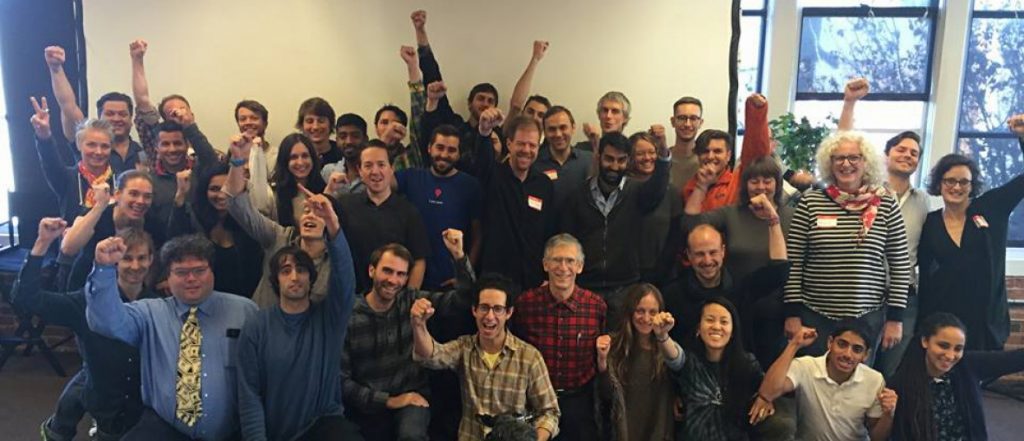CUSTOM NOTIFICATIONS
- MICAH L. SIFRY
- November 30, 2015
- 6:25 am
Tom Steinberg calls for tools that permanently shift power; the state of predictive policing in Chicago; and more.
Today’s civic tech must-read: Former mySociety director Tom Steinberg calls on technologists to focus on building tools that permanently shift power. He argues that the power-shifting effects of fundraising apps and targeted political ads have been temporary (the other side catches up), whereas “mobile computing is a power shifting technology that permanently empowers the security services.”
Parija Kavalanz reports for CNN Money on how Hive, a NY-based start-up funded by the United Nations Refugee Agency, is using predictive data modeling to find the Americans most likely to support refugees. “We’re working with the same data team that was behind President Obama’s 2008 campaign,” Hive’s director Brian Reich says.
ICitizen is a Nashville, Tennessee-based civic start-up that is working to build a community platform where constituents and government officials collaborate, Jamie McGee reports for The Tennessean. Launched in 2013, it claims 150,000 users and a staff of 57 employees currently working to enhance the app. The company has raised nearly $13 million in outside capital.
Brave new world: The Los Angeles city council wants to “to access a database of license plates captured in certain places around the city, translate these license plates to obtain the name and address of each owner, and send to that owner a letter explaining that the vehicle was seen in, ‘an area known for prostitution.’” As Nick Selby, the CEO of StreetCred Software, writes in Medium, “there are grave issues of freedom of transportation and freedom of association here.”
Related: Police in Chicago have begun delivering “custom notifications” to people that its predictive policing model says are at high risk of becoming a “party to violence” in the near future, Susan Crawford reports for Medium’s Backchannel. The letter comes with a personal knock on the door, offers of social services and a warning of the “enhanced penalties” a subject may received if arrested again for a violent crime. Crawford writes that this data-driven initiative seeks to use cops as “guardians” rather than “warriors,” building public trust and legitimacy through pro-active interventions, but with the Chicago police union currently standing firm behind the cop who shot Laquan McDonald it’s hard to see why anyone should trust that these predictive models aren’t biased at their base.
The Indian radical writer Arundhati Roy describes what it was like for her, American actor John Cusack, and Pentagon Papers whistleblower Daniel Ellsberg to meet NSA whistleblower Edward Snowden in Moscow. Two observations from her worth pondering: the first is how both Ellsberg and Snowden were, originally, totally devoted to patriotic missions (for Ellsberg, to save his country from communism, and for Snowden, to save it from Islamic terrorism). And second, how the debate over Snowden and the NSA leaves out “other countries, other cultures, other conversations.”
Trump watch: Here’s the most worrisome aspect of Molly Ball’s on-the-scene report for The Atlantic of Republican frontrunner Donald Trump’s recent mass rally in Myrtle Beach, South Carolina: “Despite all the negativity and fear, the energy in this room does not feel dark and aggressive and threatening. It doesn’t feel like a powder keg about to blow, a lynch mob about to rampage. It feels joyous.”
Journalist Dave Neiwert explains why “Trump is an extraordinarily dangerous right-wing populist demagogue, and not a genuine, in-the-flesh fascist.”
“Rob Ford in Canada was there before Trump,” writes NYU press critic Jay Rosen. Which is to say, the old assumption that blatant lies, gaffes, and misbehavior would bring down a politician, now in tatters around the Trump phenomenon, was never that solid.
Third party matters: The national Working Families Party has announced that it is holding an online endorsement vote of its members and affiliates to decide who it should back for president in the Democratic presidential primary. The WFP has affiliates in ten states, including NY, MD, NJ, CT, OR, PA and DC, plus four national partners (SEIU, MoveOn.org, CWA and Center for Popular Democracy). Each state affiliate will have two votes, to be determined by their state leadership, as will each national partner. The national membership vote will count for four votes.
The droid you are looking for: Futurist Mark Pesce (and PDM friend) writes that what’s really exciting about the forthcoming Star Wars movie is the programmable BB-8 robot toys coming to stores near you.



